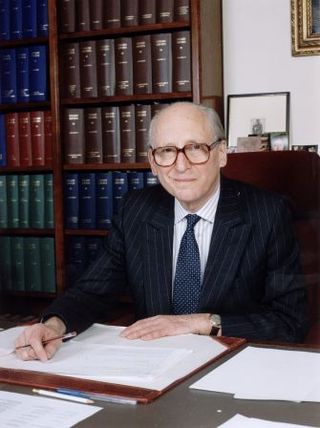
Thomas Henry Bingham, Baron Bingham of Cornhill,, was a British judge who was successively Master of the Rolls, Lord Chief Justice and Senior Law Lord. He was described as the greatest lawyer of his generation. Baroness Hale of Richmond observed that his pioneering role in the formation of the United Kingdom Supreme Court may be his most important and long-lasting legacy. Lord Phillips of Worth Matravers regarded Bingham as "one of the two great legal figures of my lifetime in the law". David Hope, Baron Hope of Craighead described Bingham as "the greatest jurist of our time".

Ultra vires is a Latin phrase used in law to describe an act that requires legal authority but is done without it. Its opposite, an act done under proper authority, is intra vires. Acts that are intra vires may equivalently be termed "valid", and those that are ultra vires termed "invalid".
Thoburn v Sunderland City Council is a UK constitutional and administrative law case, concerning the interaction of EU law and an Act of Parliament. It is important for its recognition of the supremacy of EU law and the basis for that recognition. Though the earlier Factortame had also referred to Parliament's voluntary acceptance of the supremacy of EU law, Thoburn put less stress on the jurisprudence of the ECJ and more on the domestic acceptance of such supremacy; Lord Justice Laws suggested there was a hierarchy of "constitutional statutes" that Parliament could only expressly repeal, and so were immune from implied repeal.
Judicial review is a part of UK constitutional law that enables people to challenge the exercise of power, usually by a public body. A person who contends that an exercise of power is unlawful may apply to the Administrative Court for a decision. If the court finds the decision unlawful it may have it set aside (quashed) and possibly award damages. A court may impose an injunction upon the public body.

Council of Civil Service Unions v Minister for the Civil Service[1984] UKHL 9, or the GCHQ case, is a United Kingdom constitutional law and UK labour law case that held the royal prerogative was subject to judicial review.

United Kingdom administrative law is part of UK constitutional law that is designed through judicial review to hold executive power and public bodies accountable under the law. A person can apply to the High Court to challenge a public body's decision if they have a "sufficient interest", within three months of the grounds of the cause of action becoming known. By contrast, claims against public bodies in tort or contract are usually limited by the Limitation Act 1980 to a period of 6 years.

The United Kingdom constitutional law concerns the governance of the United Kingdom of Great Britain and Northern Ireland. With the oldest continuous political system on Earth, the British constitution is not contained in a single code but principles have emerged over the centuries from common law statute, case law, political conventions and social consensus. In 1215, Magna Carta required the King to call "common counsel" or Parliament, hold courts in a fixed place, guarantee fair trials, guarantee free movement of people, and free the church from the state; it also enshrined the rights of "common" people to use the land. After the English Civil War and the Glorious Revolution 1688, Parliament won supremacy over the monarch, as well as the church and the courts, and the Bill of Rights 1689 recorded that the "election of members of Parliament ought to be free". The Act of Union 1707 unified England, Wales and Scotland, while Ireland was joined in 1800, but the Republic of Ireland formally separated between 1916 and 1921 through bitter armed conflict. By the Representation of the People Act 1928, almost every adult man and woman was finally entitled to vote for Parliament. The UK was a founding member of the International Labour Organization (ILO), the United Nations, the Commonwealth, the Council of Europe, and the World Trade Organization (WTO).

The constitution of the United Kingdom or British constitution comprises the written and unwritten arrangements that establish the United Kingdom of Great Britain and Northern Ireland as a political body. Unlike in most countries, no attempt has been made to codify such arrangements into a single document, thus it is known as an uncodified constitution. This enables the constitution to be easily changed as no provisions are formally entrenched; the Supreme Court of the United Kingdom recognises that there are constitutional principles, including parliamentary sovereignty, the rule of law, democracy, and upholding international law.
Wednesbury unreasonableness is a ground of judicial review in Singapore administrative law. A governmental decision that is Wednesbury-unreasonable may be quashed by the High Court. This type of unreasonableness of public body decisions was laid down in the English case of Associated Provincial Picture Houses v. Wednesbury Corporation (1947), where it was said that a public authority acts unreasonably when a decision it makes is "so absurd that no sensible person could ever dream that it lay within the powers of the authority".

The doctrine of legitimate expectation in Singapore protects both procedural and substantive rights. In administrative law, a legitimate expectation generally arises when there has been a representation of a certain outcome by the public authorities to an individual. To derogate from the representation may amount to an abuse of power or unfairness. The doctrine of legitimate expectation as a ground to quash decisions of public authorities has been firmly established by the English courts. Thus, where a public authority has made a representation to an individual who would be affected by a decision by the authority, the individual has a legitimate expectation to have his or her views heard before the decision is taken. Alternatively, an individual may also have a legitimate expectation to a substantive right. The recognition of substantive legitimate expectations is somewhat controversial as it requires a balancing of the requirements of fairness against the reasons for any change in the authority's policy. This suggests the adoption of a free-standing proportionality approach, which has been said not to apply in administrative law.

The remedies available in Singapore administrative law are the prerogative orders – the mandatory order, prohibiting order (prohibition), quashing order (certiorari), and order for review of detention – and the declaration, a form of equitable remedy. In Singapore, administrative law is the branch of law that enables a person to challenge an exercise of power by the executive branch of the Government. The challenge is carried out by applying to the High Court for judicial review. The Court's power to review a law or an official act of a government official is part of its supervisory jurisdiction, and at its fullest may involve quashing an action or decision and ordering that it be redone or remade.

Administrative law in Singapore is a branch of public law that is concerned with the control of governmental powers as exercised through its various administrative agencies. Administrative law requires administrators – ministers, civil servants and public authorities – to act fairly, reasonably and in accordance with the law. Singapore administrative law is largely based on English administrative law, which the nation inherited at independence in 1965.

Illegality is one of the three broad headings of judicial review of administrative action in Singapore, the others being irrationality and procedural impropriety. To avoid acting illegally, an administrative body or public authority must correctly understand the law regulating its power to act and to make decisions, and give effect to it.

The remedies available in a Singapore constitutional claim are the prerogative orders – quashing, prohibiting and mandatory orders, and the order for review of detention – and the declaration. As the Constitution of the Republic of Singapore is the supreme law of Singapore, the High Court can hold any law enacted by Parliament, subsidiary legislation issued by a minister, or rules derived from the common law, as well as acts and decisions of public authorities, that are inconsistent with the Constitution to be void. Mandatory orders have the effect of directing authorities to take certain actions, prohibiting orders forbid them from acting, and quashing orders invalidate their acts or decisions. An order for review of detention is sought to direct a party responsible for detaining a person to produce the detainee before the High Court so that the legality of the detention can be established.
Fettering of discretion by a public authority is one of the grounds of judicial review in Singapore administrative law. It is regarded as a form of illegality. An applicant may challenge a decision by an authority on the basis that it has either rigidly adhered to a policy it has formulated, or has wrongfully delegated the exercise of its statutory powers to another body. If the High Court finds that a decision-maker has fettered its discretion, it may hold the decision to be ultra vires – beyond the decision-maker's powers – and grant the applicant a suitable remedy such as a quashing order to invalidate the decision.

O'Reilly v Mackman [1983] UKHL 1 is a UK constitutional law case, concerning judicial review.

R v SS for Environment, Transport and the Regions [2001] UKHL 23 is a UK constitutional law case, concerning judicial review.

Pickin v British Railways Board[1974] UKHL 1 is a UK constitutional law case, concerning parliamentary sovereignty.

Huang v Secretary of State for the Home Department [2007] UKHL 11 is a UK constitutional law case, concerning judicial review.

R v Criminal Injuries Compensation Board, ex parte A was a 1999 case in the United Kingdom where a decision by the Criminal Injuries Compensation Board (CICB) not to award compensation was quashed by the House of Lords as it was deemed to be a breach of the rules of natural justice. The case reaffirmed the principle of "misunderstanding or ignorance of an established and relevant fact" and further developed the doctrine of error of fact, in that a decision could be quashed on the basis of it having taken into account a factual mistake. The case also dealt with the issue of undue delay and guiding principles were laid out.












